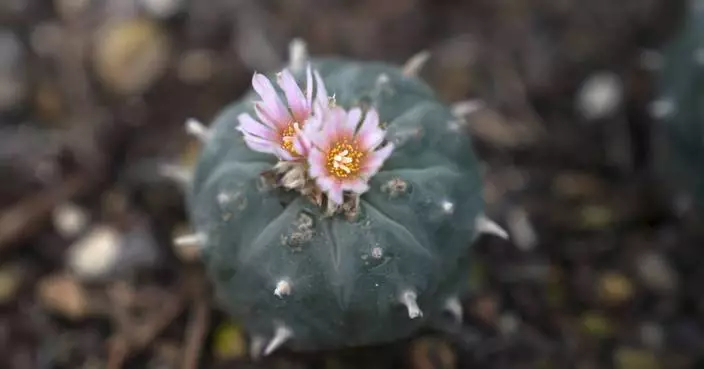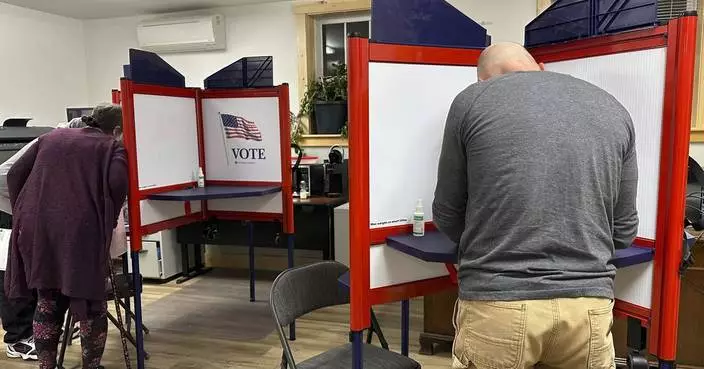LEWISTON, Maine (AP) — Votes will have to be redistributed under Maine’s ranked choice system to determine the winner of a key congressional race, election officials said.
The campaigns of both Republican challenger Austin Theriault and Democratic Rep. Jared Golden said Friday that they would participate in the process, although Golden said he already won the election, without a need for additional tabulations.
Click to Gallery
People cast their votes on Election Day, Tuesday, Nov. 5, 2024 in Pownal, Maine. (AP Photo/Joel Page)
Lt. Wayne Clifford stands outside a polling location on Election Day, at the Green Ladle, High School Campus, Tuesday, Nov. 5, 2024 in Lewiston, Maine. (AP Photo/Joel Page)
Voters fill out their ballots on Election Day Tuesday, Nov. 5, 2024 at the Cross Insurance Center in Bangor, Maine. (AP Photo/Joel Page)
Rep. Jared Golden, D-Maine, walks down a hallway before addressing the media Wednesday afternoon, Nov. 6, 2024, during a press conference at his campaign office in Lewiston, Maine. (Russ Dillingham/Sun Journal via AP)
Rep. Jared Golden, D-Maine, gestures as he walks to the podium to address the media Wednesday afternoon, Nov. 6, 2024, during a press conference at his campaign office in Lewiston, Maine. (Russ Dillingham/Sun Journal via AP)
Rep. Jared Golden, D-Maine, fields a question from the media Wednesday afternoon, Nov. 6, 2024, during a press conference at his campaign office in Lewiston, Maine. (Russ Dillingham/Sun Journal via AP)
Rep. Jared Golden, D-Maine, addresses the media Wednesday afternoon, Nov. 6, 2024, during a press conference at his campaign office in Lewiston, Maine. (Russ Dillingham/Sun Journal via AP)
Republican congressional candidate Austin Theriault, center, poses for a photo with supporters Tuesday, Nov. 5, 2024 outside the Cross Insurance Center in Bangor, Maine. (AP Photo/Joel Page)
Republican congressional candidate Austin Theriault, right speaks with Carlos Kennelly, left, Tuesday, Nov. 5, 2024 outside the Cross Insurance Center in Bangor, Maine. (AP Photo/Joel Page)
A person submits his ballot on Election Day, Tuesday, Nov. 5, 2024 in Lewiston, Maine. (AP Photo/Joel Page)
Ranked voting will determine the winner of Maine's 2nd Congressional District
Voters fill out their ballots on Election Day Tuesday, Nov. 5, 2024, at the Cross Insurance Center in Bangor, Maine. (AP Photo/Joel Page)
Ranked voting will determine the winner of Maine's 2nd Congressional District
The matchup between Golden and Theriault in Maine's 2nd Congressional District was one of a handful of pivotal races still without a declared winner, with control of the U.S. House of Representatives at stake.
The two candidates were both just below 49%, with Golden holding a slight edge of about 2,000 votes, according to figures released Thursday night by the Maine Department of the Secretary of State. At this point, Maine's winner won't be announced until next week.
Under ranked voting, if no candidate achieves a majority on the first round, the lesser choices of the last-place finisher’s supporters are reallocated to establish a majority. Golden and Theriault were the only candidates on the ballot, but Diana Merenda of Surry, who ran an organized write-in candidacy, received several hundred votes. The second choices of any voters who left their first choice blank also will be counted.
Hundreds of votes for people other than Merenda, the declared write-in, will be treated as blanks. Any blank ballots with no second choice also will be removed from the total, bringing Golden and Theriault closer to a head-to-head count.
The Associated Press has not declared a winner in the race. Now that won’t happen until next week, after the ballots from all of the district's many cities and towns are transported to the state capital and re-scanned into a computer in a centralized location.
The initial count was so close that Theriault already took the step of requesting a recount, but Theriault’s campaign signaled Friday that it was supportive of the ranked count.
“There is a process in place and we look forward to the process unfolding according to the law,” Theriault campaign manager Shawn Roderick said.
Golden, who had declared victory on Wednesday after some news organizations reported that he had won, said the ranked choice process isn't necessary. His campaign said Friday that it will “participate in any Secretary of State process to determine election results." However, the campaign also said it objects to the inclusion of blank ballots in determining whether the ranked run-off is necessary.
“As we have outlined in letters to the Secretary, a straightforward reading of the current rules makes clear that Congressman Jared Golden won the majority of first-choice votes for a candidate, and is thus the winner,” the Golden campaign said.
Maine has no mandatory recounts, even in close elections. But the state does allow candidates to request a recount. The state does not require a deposit for a recount if the margin of victory is 1% or less in congressional races.
The thin margin came in an election in which Republican Donald Trump won the 2nd District, allowing him to collect one of Maine's four electoral votes. Maine is one of two states that split electoral votes.
During the campaign, Golden touted his ability to work with members of either political party along with his advocacy on behalf of the lobster industry, which is the lifeblood of the region’s economy.
Theriault, who was first elected to the Maine House of Representatives in 2022, spent much of the campaign portraying Golden as too liberal for the district. Although Theriault had the backing of Trump, he also attempted to portray himself as a potential uniter during a divided time in Washington.
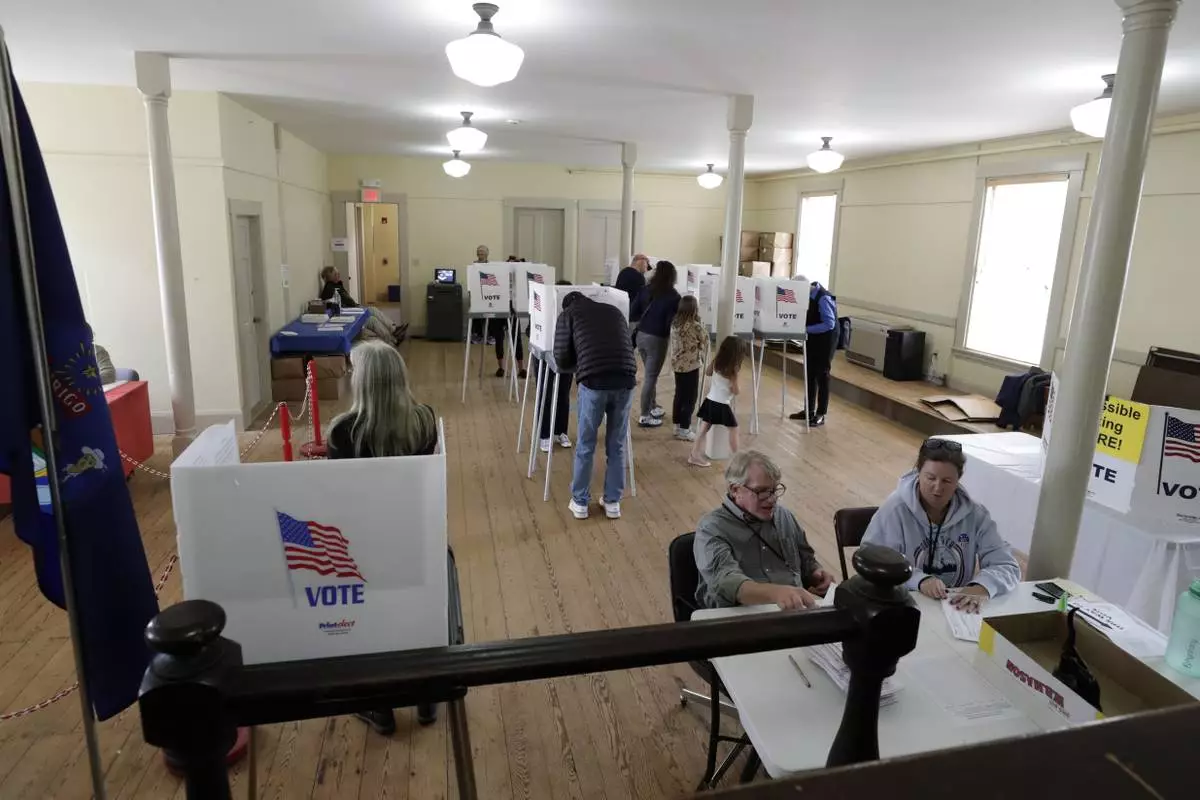
People cast their votes on Election Day, Tuesday, Nov. 5, 2024 in Pownal, Maine. (AP Photo/Joel Page)

Lt. Wayne Clifford stands outside a polling location on Election Day, at the Green Ladle, High School Campus, Tuesday, Nov. 5, 2024 in Lewiston, Maine. (AP Photo/Joel Page)
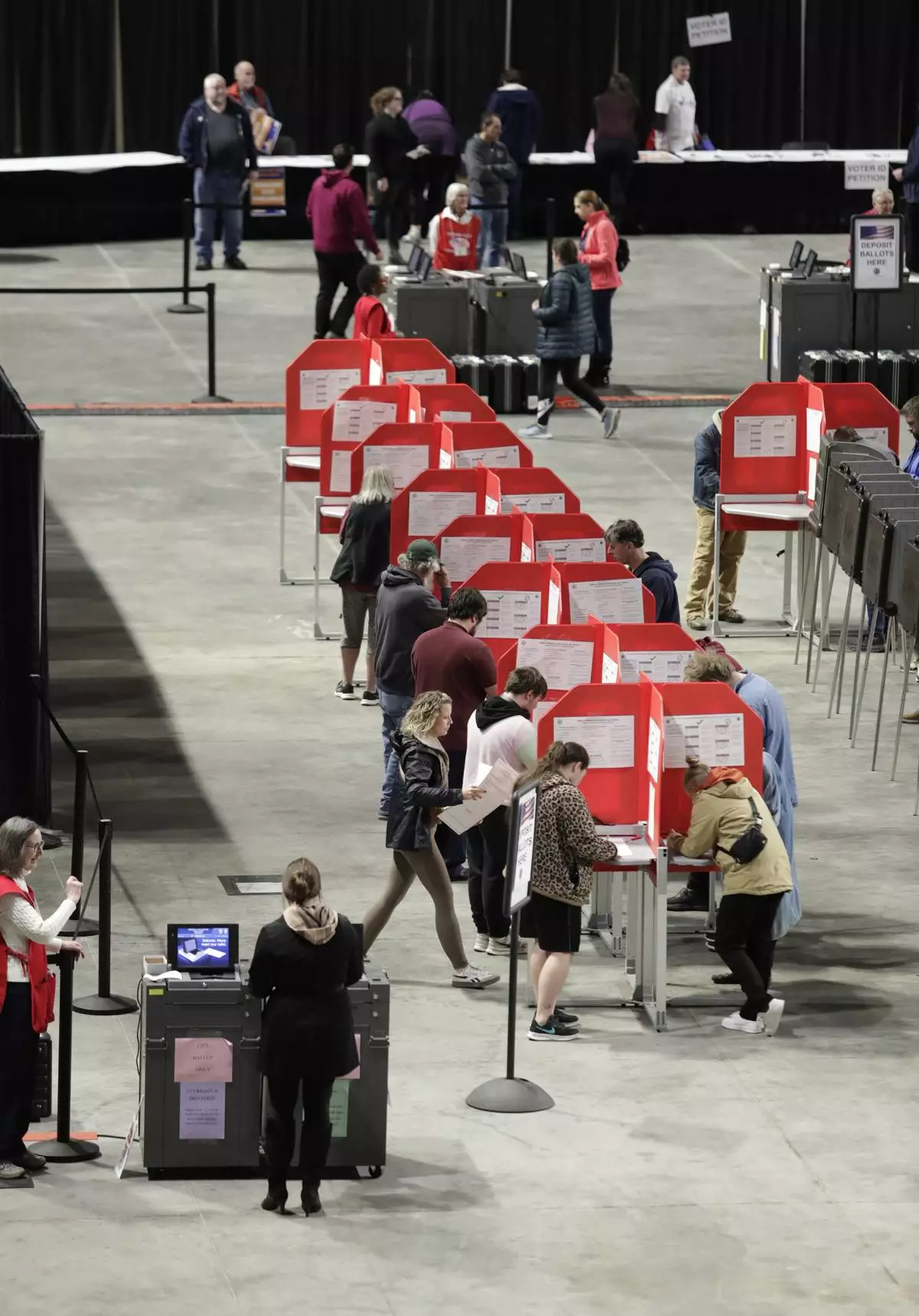
Voters fill out their ballots on Election Day Tuesday, Nov. 5, 2024 at the Cross Insurance Center in Bangor, Maine. (AP Photo/Joel Page)

Rep. Jared Golden, D-Maine, walks down a hallway before addressing the media Wednesday afternoon, Nov. 6, 2024, during a press conference at his campaign office in Lewiston, Maine. (Russ Dillingham/Sun Journal via AP)

Rep. Jared Golden, D-Maine, gestures as he walks to the podium to address the media Wednesday afternoon, Nov. 6, 2024, during a press conference at his campaign office in Lewiston, Maine. (Russ Dillingham/Sun Journal via AP)

Rep. Jared Golden, D-Maine, fields a question from the media Wednesday afternoon, Nov. 6, 2024, during a press conference at his campaign office in Lewiston, Maine. (Russ Dillingham/Sun Journal via AP)

Rep. Jared Golden, D-Maine, addresses the media Wednesday afternoon, Nov. 6, 2024, during a press conference at his campaign office in Lewiston, Maine. (Russ Dillingham/Sun Journal via AP)
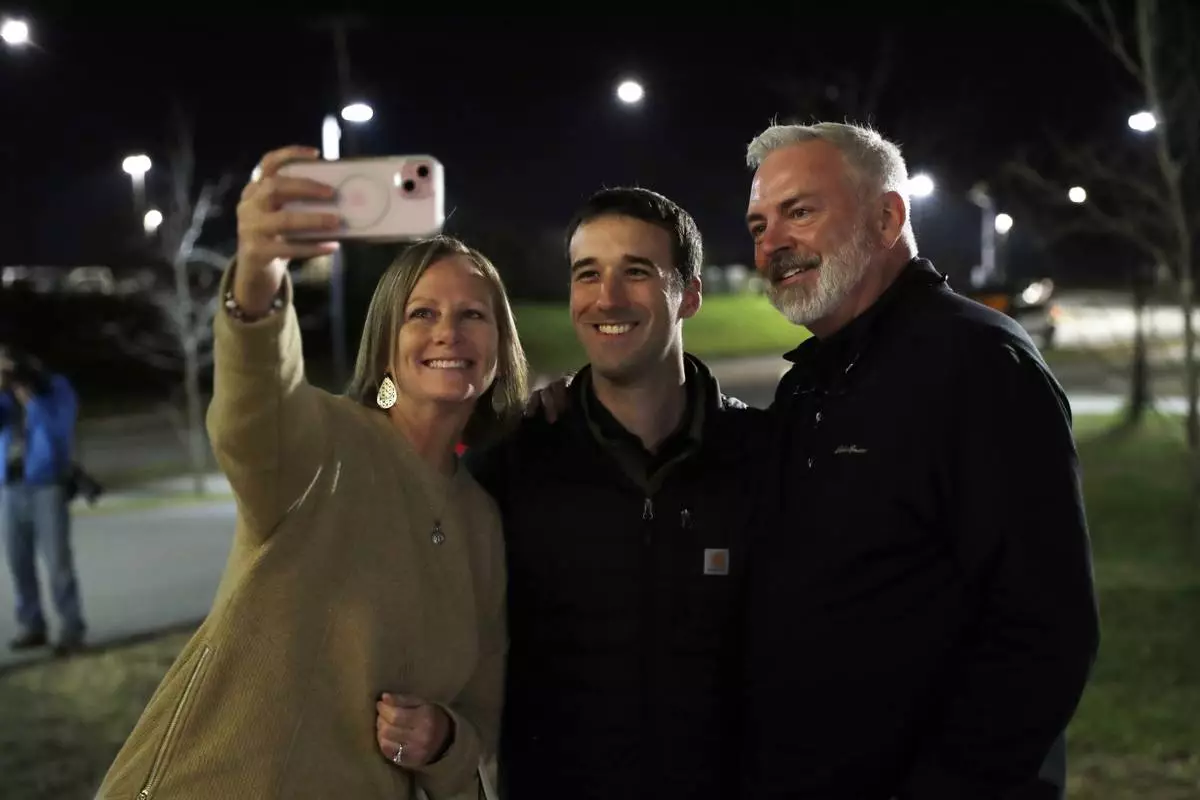
Republican congressional candidate Austin Theriault, center, poses for a photo with supporters Tuesday, Nov. 5, 2024 outside the Cross Insurance Center in Bangor, Maine. (AP Photo/Joel Page)
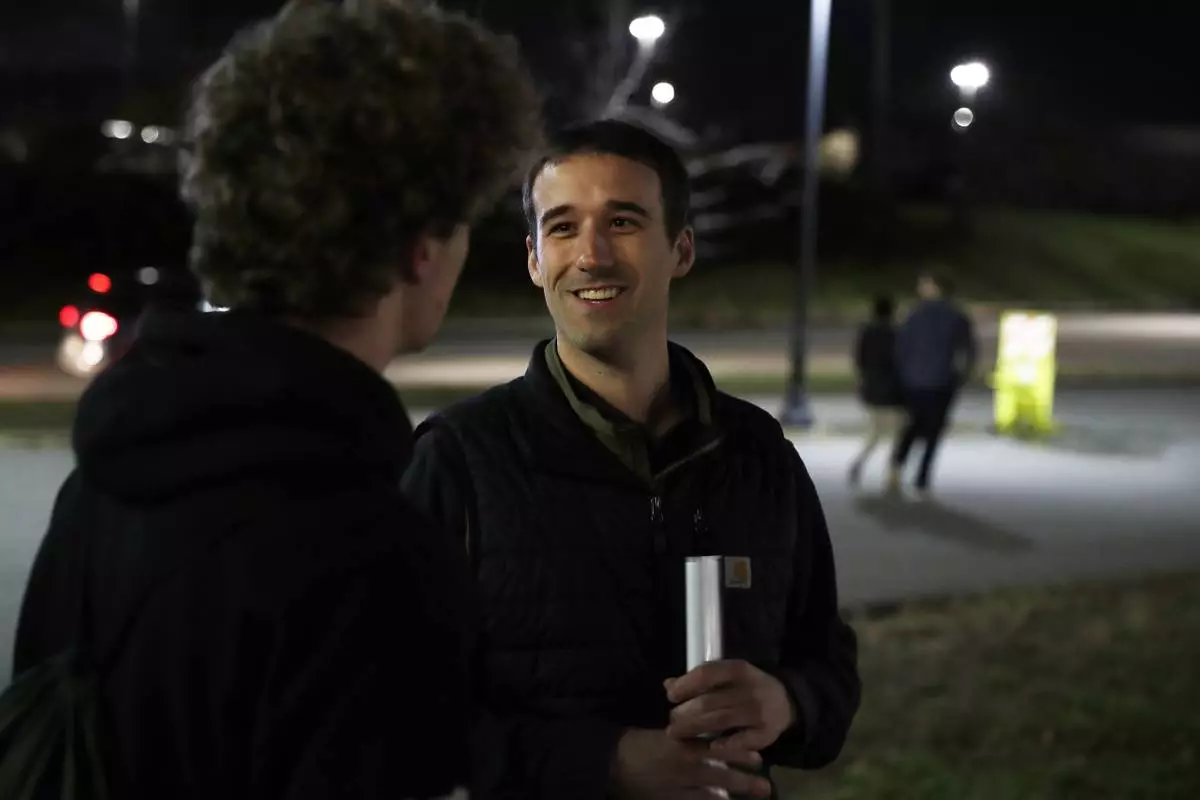
Republican congressional candidate Austin Theriault, right speaks with Carlos Kennelly, left, Tuesday, Nov. 5, 2024 outside the Cross Insurance Center in Bangor, Maine. (AP Photo/Joel Page)

A person submits his ballot on Election Day, Tuesday, Nov. 5, 2024 in Lewiston, Maine. (AP Photo/Joel Page)
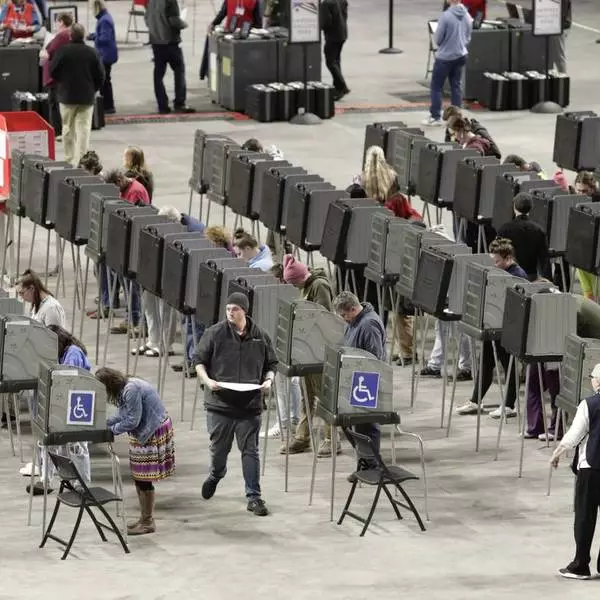
Ranked voting will determine the winner of Maine's 2nd Congressional District
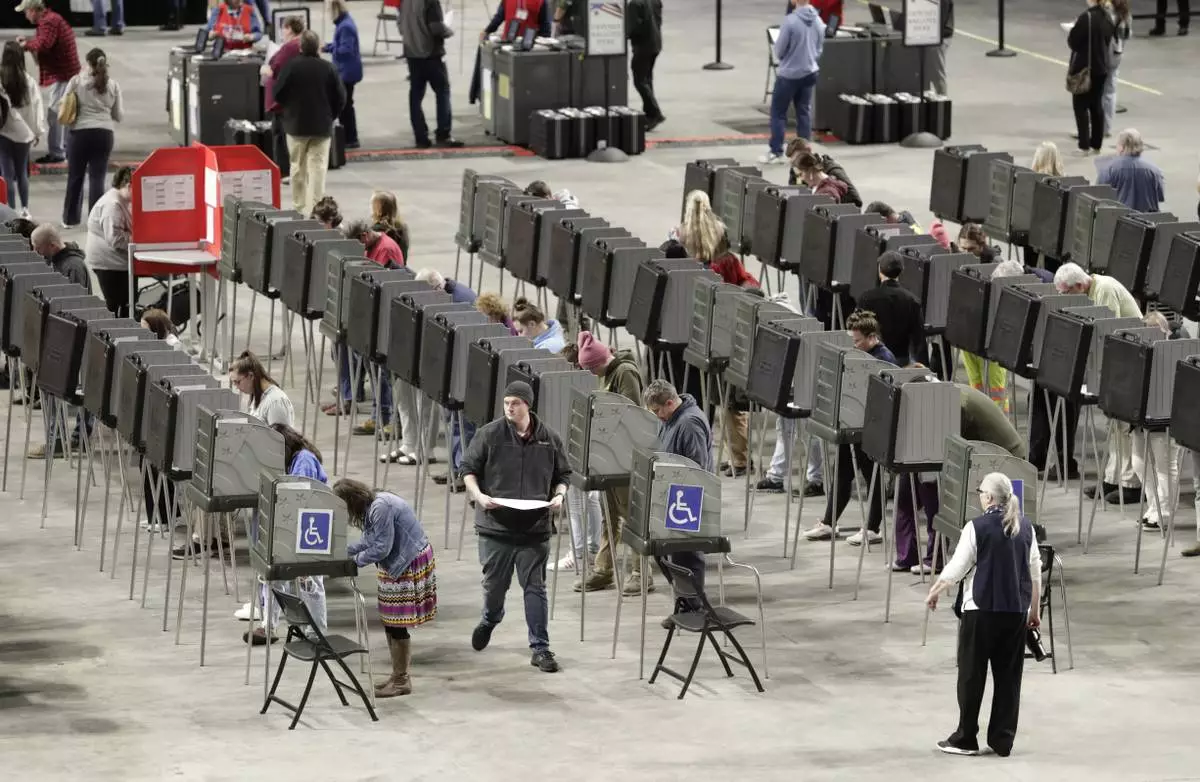
Voters fill out their ballots on Election Day Tuesday, Nov. 5, 2024, at the Cross Insurance Center in Bangor, Maine. (AP Photo/Joel Page)
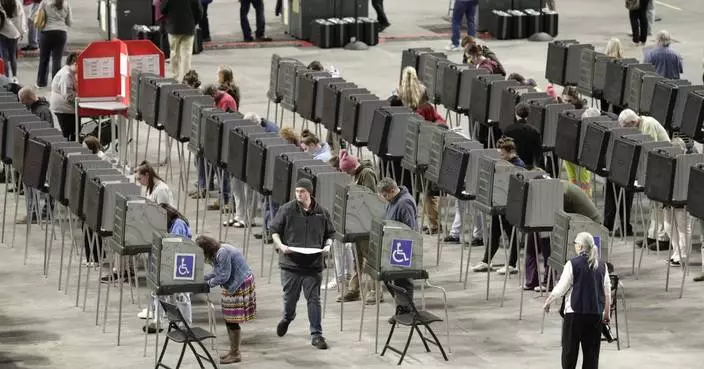
Ranked voting will determine the winner of Maine's 2nd Congressional District
The Native American Church is considered the most widespread religious movement among the Indigenous people of North America. It holds sacred the peyote cactus, which grows naturally only in some parts of southern Texas and northern Mexico. Peyote has been used spiritually in ceremonies, and as a medicine by Native American people for millennia.
It contains several psychoactive compounds, primarily mescaline, which is a hallucinogen. Different tribes of peyote people have their own name for the cactus. While it is still a controlled substance, U.S. laws passed in 1978 and 1994 allow Native Americans to use, harvest and transport peyote. However, these laws only allow federally recognized Native American tribes to use the substance and don't apply to the broader group of Indigenous people in the US.
The Native American Church developed into a distinct way of life around 1885 among the Kiowa and Comanche of Oklahoma. After 1891, it began to spread as far north as Canada. Now, more than 50 tribes and 400,000 people practice it. In general, the peyotist doctrine espouses belief in one supreme God who deals with humans through various spirits that then carry prayers to God. In many tribes, the peyote plant itself is a deity, personified as Peyote Spirit.
The Native American Church is not one unified entity like, say, the Catholic Church. It contains a diversity of tribes, beliefs and practices. Peyote is what unifies them. After peyote was banned by U.S. government agents in 1888 and later by 15 states, Native American tribes began incorporating as individual Native American Churches in 1918. In order to preserve the peyote ceremony, the federal and state governments encouraged Native American people to organize as a church, said Darrell Red Cloud, the great-great grandson of Chief Red Cloud of the Lakota Nation and vice president of the Native American Church of North America.
In the following decades, the religion grew significantly, with several churches bringing Jesus Christ’s name and image into the church so their congregations and worship would be accepted, said Steve Moore, who is non-Native and is an attorney with the Native American Rights Fund.
“Local religious leaders in communities would see the image of Jesus, a Bible or cross on the wall of the meeting house or tipi and they would hear references to Jesus in the prayers or songs,” he said. “That probably helped persuade the authorities that the Native people were in the process of transformation to Christianity.”
This persecution of peyote people continued even after the formation of the Native American Church, said Frank Dayish Jr. a former Navajo Nation vice president and chairperson for the Council of the Peyote Way of Life Coalition.
In the 1960s, there were laws prohibiting peyote in the Navajo Nation, he said. Dayish remembers a time during that period when police confiscated peyote from his church, poured gasoline on the plants and set them on fire.
“I remember my dad and other relatives went over and saved the green peyote that didn’t burn,” he said, adding that it took decades of lobbying until an amendment to the American Indian Religious Freedom Act in 1994 permitted members of federally recognized Native American tribes to use peyote for religious purposes.
Peyote is the central part of a ceremony that takes place in a tipi around a crescent-shaped earthen altar mound and a sacred fire. The ceremony typically lasts all night and includes prayer, singing, the sacramental eating of peyote, water rites and spiritual contemplation.
Morgan Tosee, a member of the Comanche Nation who leads ceremonies within the Comanche Native American Church, said peyote is utilized in the context of prayer — not smoked — as many tend to imagine.
“When we use it, we either eat it dry or grind it up,” he said. “Sometimes, we make tea out of it. But, we don’t drink it like regular tea. You pray with it and take little sips, like you would take medicine."
Tosee echoes the belief that pervades the church: "If you take care of the peyote, it will take care of you.”
“And if you believe in it, it will heal you,” he said, adding that he has seen the medicine work, healing people with various ailments.
People treat the trip to harvest peyote as a pilgrimage, said Red Cloud. Typically, prayers and ceremonies take place before the pilgrimage to seek blessings for a good journey. Once they get to the peyote gardens, they would touch the ground and thank the Creator before harvesting the medicine. The partaking of peyote is also accompanied by prayer and ceremony. The mescaline in the peyote plant is viewed as God's spirit, Red Cloud said.
“Once we eat it, the sacredness of the medicine is inside of us and it opens the spiritual eye,” he said. “From there, we start to see where the medicine is growing. It shows itself to us. Once we complete the harvest, we bring it back home and have another ceremony to the medicine and give thanks to the Creator.”
Associated Press religion coverage receives support through the AP’s collaboration with The Conversation US, with funding from Lilly Endowment Inc. The AP is solely responsible for this content.

The property of the late Amada Cardenas, who was one of the first federally licensed peyote dealers, alongside her husband, to harvest and sell the sacramental plant to followers of the Native American Church, in Mirando City, Texas, Monday, March 25, 2024. (AP Photo/Jessie Wardarski)






























